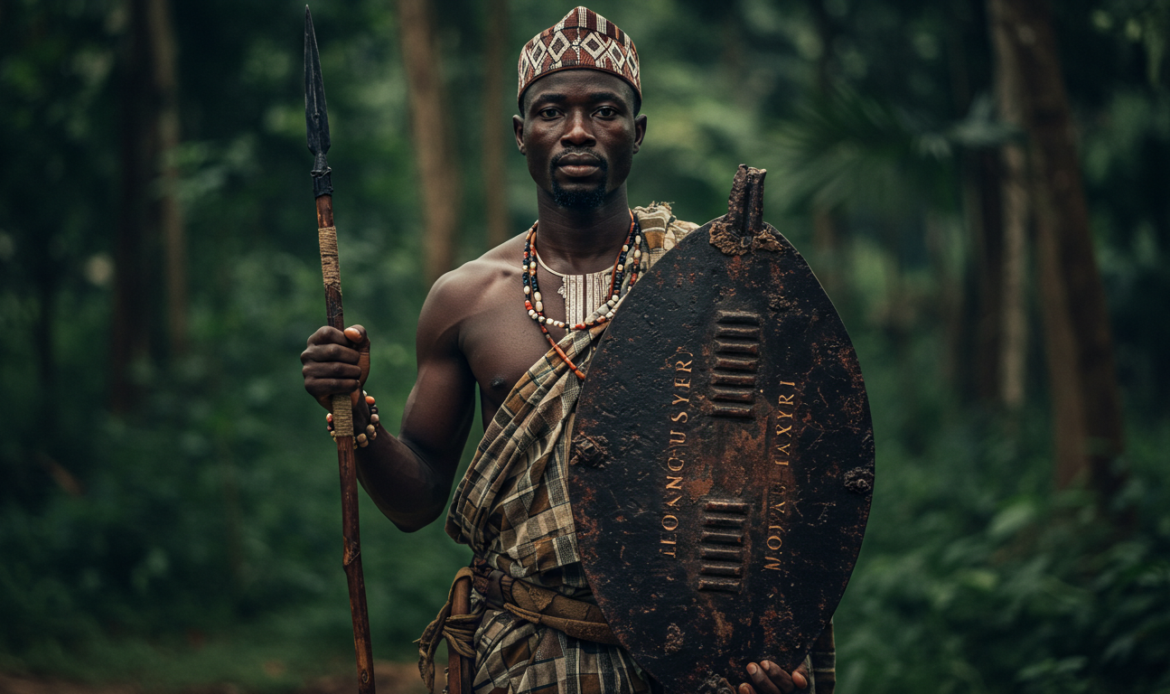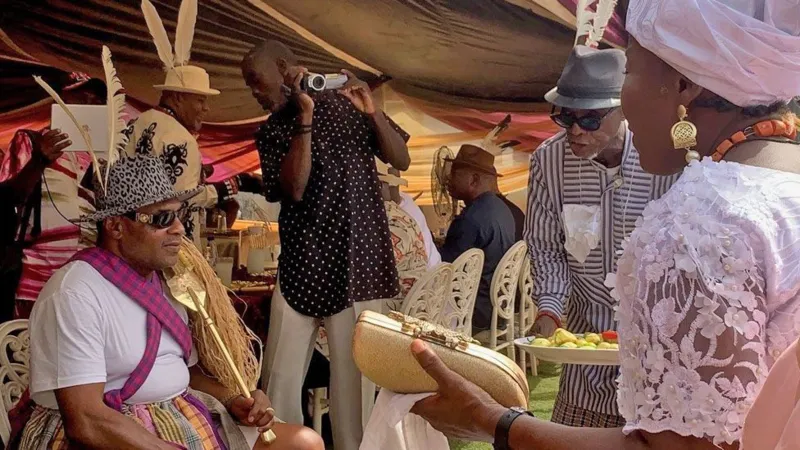
Across Africa, ancient traditions have long served as markers of identity, social status, and cultural continuity. Among the Igbo people of southeastern Nigeria, one of the most prestigious titles a man can earn is that of the Leopard Slayer or Ogbuagu. This revered title symbolizes bravery, wealth, and leadership, once earned through the dangerous feat of hunting and killing a leopard. However, as time passed and conservation concerns arose, the tradition evolved, maintaining its deep cultural significance while adapting to modern realities.
To this day, men seek the honor of being inducted into the Igbuu Society, a highly exclusive brotherhood of Ogbuagu that commands immense respect in the community. The path to becoming a Leopard Slayer is rigorous and deeply spiritual, requiring elaborate ceremonies, significant financial contributions, and adherence to ancestral customs.
But what makes this title so prestigious? Why do men, even those in the diaspora, still yearn for this recognition? To understand the weight of this honor, we must journey through history, tradition, and the enduring power of cultural heritage.
The Origins of the Leopard Slayer Title

The Ogbuagu title, translated as “Leopard Slayer,” has deep historical roots among the Igbo people of southeastern Nigeria, particularly in Oguta, a town known for its rich traditions and distinct cultural identity. The title traces back over four centuries to when early migrants from the ancient Benin Kingdom settled in Oguta, bringing with them warrior traditions that emphasized strength, leadership, and community honor.
In ancient times, the leopard was a feared predator and a symbol of power, mystery, and danger. Hunting and killing such a formidable beast was considered the ultimate test of a man’s bravery, skill, and divine favor. To earn the title of Ogbuagu, a man had to personally slay a leopard and present its carcass to the Eze Igwe, the town’s traditional ruler. The meat was then distributed among 25 surrounding villages, reinforcing the communal significance of the ritual.
Becoming a Leopard Slayer was more than just an individual achievement—it was a service to the community, a testament to courage, and a pathway to social ascension. The title granted the holder decision-making power, direct access to the king, and a seat among the town’s respected elders.
While the tradition remained a core part of Oguta’s identity for centuries, shifting societal values and environmental concerns gradually modified how the title was attained. What once required physical prowess in hunting transformed into a symbolic representation of leadership and community service.
Read: All you need to know about the Zulu Culture
The Evolution of the Tradition
As society evolved, so did the Ogbuagu tradition, adapting to changes in wildlife conservation, shifting cultural values, and modernization. The once-sacred practice of hunting leopards gradually faded due to the dwindling population of the animal and the recognition of its ecological importance. The last recorded leopard hunt for the ceremony occurred in 1987, after which environmental concerns led to a complete shift in how the title was attained.
The first significant modification in the tradition occurred in 1942 when a candidate unable to secure a leopard was permitted to pay a monetary substitute. This precedent allowed future candidates the option of financial contribution instead of hunting, reflecting the growing difficulty of capturing a leopard. By the late 20th century, the killing of leopards had become nearly impossible, and the tradition transitioned fully into a symbolic ceremony. Today, instead of presenting an actual leopard, initiates offer a significant financial sum to the Eze Igwe, distributed among the 25 surrounding villages—a modern reinterpretation of the communal feast once held with leopard meat.
Despite this shift, the essence of the tradition remains intact. The Ogbuagu title still represents bravery, leadership, and prestige within the community. The titleholders continue to wield influence, being consulted on major town decisions and regarded as cultural custodians.
Additionally, the ceremonies have become more elaborate, drawing members of the Oguta diaspora home for the festivities, particularly in December, when many travel back for the holiday season. Though no longer defined by physical combat, the Ogbuagu tradition remains a respected symbol of honor, deeply woven into the cultural fabric of Oguta.
The Ritual: Three Stages to Becoming a Leopard Slayer

The journey to becoming an Ogbuagu is no simple feat. It is a process steeped in symbolism, tradition, and prestige, carried out through three elaborate stages. Though no longer involving an actual leopard hunt, these ceremonies remain deeply rooted in the original spirit of the tradition—a test of commitment, honor, and communal reverence.
Stage One: Igbu Agu – The Symbolic Hunt
The first stage, known as Igbu Agu (literally “Leopard Killing”), represents the ritual reenactment of the ancient leopard hunt. This event is a grand public spectacle, drawing large crowds as the initiate steps into the symbolic role of the warrior-hunter.
On the day of the ceremony, the candidate is escorted by current members of the Igbuu Society, each wielding their gold-colored swords, a powerful emblem of their status. The event begins at the initiate’s family home, where they are presented with a sword engraved with their name, marking their transition into the sacred brotherhood. A palm frond is tied to their wrist, and chalk markings are drawn on their hands—traditional signs of bravery and initiation.
This stage culminates in a procession through the town, where fake leopard skin symbolizes the victorious hunt. The initiate, now publicly recognized, must present the required financial contribution—a sum that echoes the historical practice of offering the leopard to the king and sharing its meat among the villages.
Stage Two: Iga Aji – The Sacred Ritual
The second phase, Iga Aji, is a more private and spiritual ceremony conducted in the initiate’s home. Senior members of the Igbuu Society oversee this segment and guide the initiate through a series of ancestral rites.
At this stage, the initiate receives the red sash, a powerful symbol of royalty and authority within Oguta society. They are adorned with sacred beads and feathers, further signifying their elevated status. The initiate must then formally greet elders and members of the society, acknowledging their place within the hierarchy.
This stage solidifies the initiate’s commitment to upholding the traditions and responsibilities of the Ogbuagu title, reinforcing society’s spiritual and communal bonds.
Stage Three: Ipu Afia Agu – The Grand Feast
The final stage, Ipu Afia Agu, is the most extravagant. It is a lavish celebration featuring large feasts, music, and dance.
The ceremony begins at the home of the initiate’s mother, a crucial nod to maternal lineage and family honor. Guests, including community leaders, family, and well-wishers, gather to celebrate, showering the new Ogbuagu with gifts and praises.
After the initial gathering, the festivities move to the initiate’s own home, where an elaborate banquet is hosted. Traditional dishes such as pounded yam, nsala soup, and palm wine are served in abundance, reinforcing the communal nature of the title.
Finally, the symbolic leopard skin is paraded through the streets, marking the initiate’s full acceptance into the prestigious brotherhood. From this moment onward, the newly inducted Ogbuagu is accorded the highest levels of respect and honor, forever recognized as a guardian of tradition and a leader within the community.
The Social Prestige of the Ogbuagu Title

Becoming an Ogbuagu is not merely a personal achievement but a symbol of high social standing and deep cultural reverence in Oguta and beyond. Holding the Leopard Slayer title confers a unique status that sets its bearers apart, granting them privileges, respect, and influence in both traditional and modern settings.
A Title of Distinction and Authority
In Oguta, the Ogbuagu title is more than ceremonial—it is a marker of leadership and honor. Those who attain this status are regarded as cultural custodians entrusted with preserving the customs of their ancestors. At traditional gatherings, Ogbuagu members are accorded special seating, and their presence demands recognition.
Unlike other members of society, they do not bow before the king but instead stand and greet him as equals, signifying their rank. During public events, weddings, and community meetings, their names are called first, and their words carry significant weight in decision-making.
Read: The Role of Storytelling in African Cultures
A Symbol of Wealth and Success
Membership in the Igbuu Society also reflects personal success. Given the financial commitment required for initiation, becoming an Ogbuagu indicates economic stability, social influence, and a deep connection to one’s heritage. It is an honor often pursued by men of means—businessmen, professionals, and community leaders—who wish to cement their legacy within their ancestral homeland.
This blend of spiritual reverence, social prestige, and economic power makes the Ogbuagu title one of the most coveted honors in Igbo culture today.
A Legacy Preserved
The Ogbuagu title is more than a relic of the past; it is a living testament to the enduring power of tradition in Igbo society. Despite the disappearance of leopards from the ritual and the passage of time, the spirit of the title remains unshaken, evolving to preserve its core values of honor, bravery, and communal identity.
In modern times, the Leopard Slayer title serves as a bridge between generations, linking the ancestors with contemporary society. It reinforces the importance of cultural heritage, ensuring that even as the world changes, certain traditions remain steadfast. The prestige of the Ogbuagu continues to inspire many, proving that tradition is not static—it adapts, transforms, and thrives.
For those who pursue the title today, the journey is not just about personal recognition but about becoming part of something greater—a lineage of men who have defended and upheld the values of their people. As long as there are sons of Oguta who seek to honor their forefathers, the legacy of the Leopard Slayer will endure, standing as a powerful reminder of the richness and resilience of African heritage.
